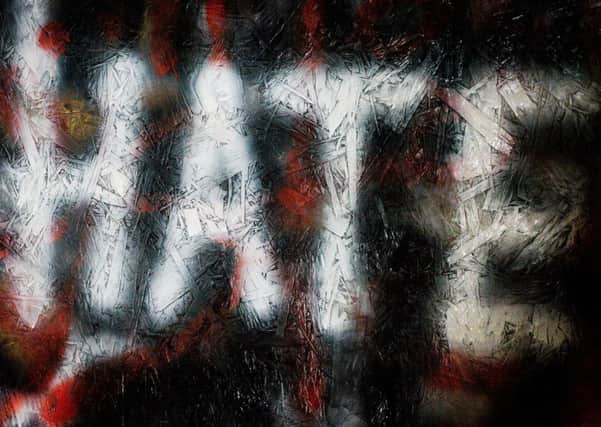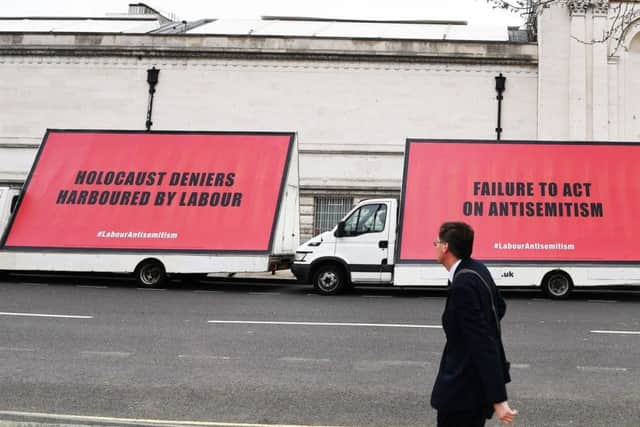Eric Pickles: I have been fighting racists and anti-Semites for 50 years. I have never before experienced more intolerance


Thinking of those statistics, imagine the pain of a friend, all their friends and family, and the 94,000 people who feel the hurt that persecution causes, and consider the corrosive effect it has on society.
I have been involved in politics for 50 years, and in fighting racists and anti-Semites for just as long. I have never before experienced more intolerance in politics and society. There is a coarseness in politics.
Advertisement
Hide AdAdvertisement
Hide AdLabour has outlined the growth in the far right – I do not seek to diminish it – but I cannot help but feel that is only half the picture. As the former Chief Rabbi, Lord Sacks, recently said: “Anti-Semitism, or any hate, becomes dangerous when three things happen. First, when it moves from the fringes of politics to a mainstream party and its leadership.


“Secondly, when the party sees that its popularity with the general public is not harmed thereby.
“Thirdly, when those who stand up and protest are vilified and abused for doing so. All three factors exist in Britain now.”
Advertisement
Hide AdAdvertisement
Hide AdI think we are beholden, as politicians – as leaders of society – to speak clearly and robustly against anti-Semitism and any form of prejudice, but to do so in moderate and liberal language. Whether we are politicians or distinguished columnists, we have a duty to ensure that in defending liberal values, we do not speak in illiberal terms.
Britain has a number of vibrant communities that are a fundamental part of the British identity. Sometimes we have a romantic view of John Bull, or of a Dickensian existence, but it was never so.
Even in Tudor times this country had people from different backgrounds, races and countries. They are all a fundamental part of the British identity: Christians, Muslims, Jews, Hindu, Sikhs, Jains, Buddhists and others – people of faith and no faith – are a vital part of what makes this nation tick.
Advertisement
Hide AdAdvertisement
Hide AdWithout them we would be a lesser place. If we want to understand what the effect would be, we need only look at central and eastern Europe. Even 70-odd years after the war, the removal of their Jewish communities has ripped the heart out of those countries, and even now they have not recovered from that devastation. We all, therefore, have a vested interest in fighting intolerance.
There is, right now, a growing number of countries across the world which are starting to build new monuments and institutions relating to anti-Semitism and the Holocaust. Why is this happening? The historian Simon Schama said that the true assessment of the French Revolution did not occur until the 1850s, when anyone who had experienced it had passed away. We have some experience of that here, in the centenary of the First World War, of which a great reassessment has been taking place.
In my maiden speech in the House of Lords, I talked about the influence of my grandfather Smith, who served in the Royal Navy, and my grandfather Pickles, who served on the Somme. Nobody doubts that those two gentlemen served their time in the war: there is no industry saying that the First World War did not happen, or the Somme did not happen, but there is a whole industry of Holocaust denial, and we remember that the final stage of a genocide is denial.
About a year ago I visited Treblinka, one of the terrible death camps, which was only in existence for about a year and killed almost a million people. Nobody was separated for work; everyone was killed. I took a photograph of the monument, which is quite a moving one, and posted it on Twitter, as we politicians tend to do. Within minutes I received a reply that said “No-one died at Treblinka, it was a transit camp. There was no death there, and any deaths related to influenza”.
Advertisement
Hide AdAdvertisement
Hide AdYou wonder whether someone like that really believes it. I met representatives of the United States Holocaust Museum. It has the distinction of being the second most popular site on the web relating to the Holocaust. Sadly, the most popular is the Holocaust denial site, which leads by a considerable margin.
At a time when parts of Europe are seeking to rewrite history, it is important for us to set a clear example that we will look at our history with an unblinking eye – and this extends to the memorial to anti-Semitism due to be built outside the Palace of Westminster.
The real reason it will go there is because it will remind people that Parliament is a bastion against tyranny. And it will remind both Houses of Parliament that the legislature has a power to protect or to oppress. We will remember that a compliant legislature introduced the Nuremberg laws. It is my sincere hope that we will build a monument of which we will all be proud; we will build a learning centre that will be a beacon to the world.
Eric Pickles is a Conservative peer and former Communities Secretary. Born in Keighley, he spoke in a House of Lords debate on religious intolerance and bigotry. This is an edited version.